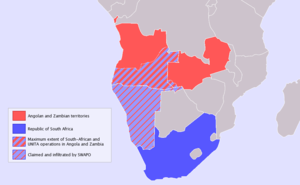United Nations Security Council Resolution 602
| UN Security Council Resolution 602 | |
|---|---|
|
South African border operations | |
| Date | 25 November 1987 |
| Meeting no. | 2,767 |
| Code | S/RES/602 (Document) |
| Subject | Angola-South Africa |
Voting summary |
15 voted for None voted against None abstained |
| Result | Adopted |
| Security Council composition | |
Permanent members | |
Non-permanent members | |
United Nations Security Council resolution 602, adopted unanimously on 25 November 1987, after hearing representations from the People's Republic of Angola, the Council recalled resolutions 387 (1976), 428 (1978), 447 (1979), 454 (1979), 475 (1980), 545 (1983), 546 (1984), 567 (1985), 571 (1985), 574 (1985) and 577 (1985), expressing its concern at the continuing attacks on the country by South Africa through occupied South West Africa (Namibia).
The Council demanded South Africa cease the attacks and respect Angola's sovereignty and territorial integrity, noting the "illegal entry of the head of the racist South African regime and some of his Ministers" into Angola. The representative of Ghana, which introduced the resolution, said the continued attacks were an affront to the Council's authority.[1] It called for a complete and unconditional withdrawal of South African forces from southern Angola, requesting the Secretary-General to monitor the implementation of the current resolution and reporting back no later than 10 December 1987.
The resolution was a direct rejection of South Africa's offer to withdraw its troops from Angola if other nations, such as Cuba, did the same.[2]
See also
- Angola – South Africa relations
- Cuban intervention in Angola
- Namibian War of Independence
- South Africa Border Wars
- South Africa under apartheid
- United Nations Security Council Resolution 606
- Operation Modular
References
- ↑ United Nations (2000). Repertoire of the practice of the Security Council: supplement 1985–1988. United Nations Publications. p. 267. ISBN 978-92-1-137029-4.
- ↑ "UN council condemnds S. Africa on Angola". Chicago Sun-Times. 26 November 1987.
External links
| Wikisource has original text related to this article: |
| ||||||
